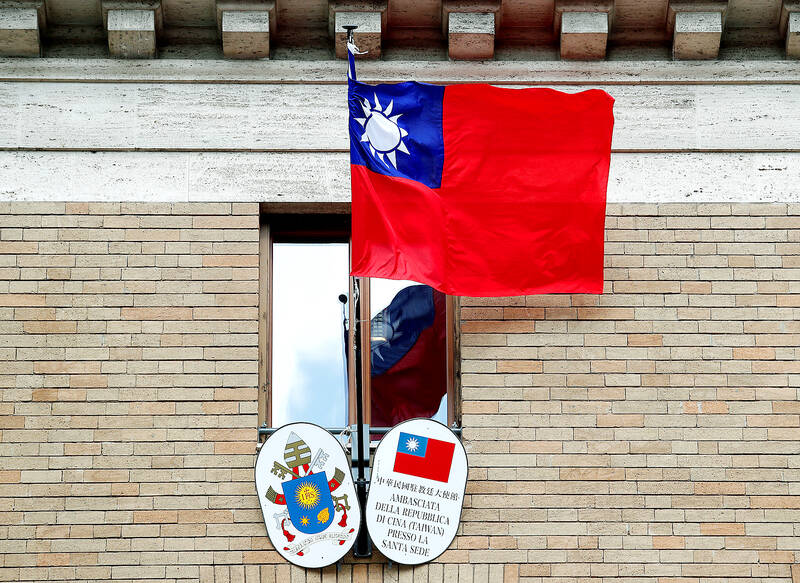Taiwan respects the Holy See’s reassurances that its agreement with China on appointing bishops does not broach political or diplomatic matters, the Ministry of Foreign Affairs (MOFA) said on Saturday.
A compromise provisional deal on appointments in China has been extended by the Vatican for a second time.
The Holy See is one of 14 sovereign entities that maintain full diplomatic ties with Taiwan, and is the only European state to do so, although its relations with Beijing have warmed under the leadership of Pope Francis.

Photo: Reuters
The Vatican and China on Saturday said that they have agreed to extend their agreement on the appointment of bishops for another two years, despite widespread criticism that Beijing has waged crackdowns on religious groups.
The agreement allows the pope to have the final say on the appointment of bishops in China, in an attempt by the Vatican to mitigate Beijing’s influence on Catholic churches.
Before the first agreement in 2018, only clandestine churches would pledge loyalty to the pope. Under the deal, state churches can recognize the pontiff as the supreme leader of the church.
The Holy See said on Saturday that the arrangement underlines its commitment to “constructive dialogue” with China and improving bilateral relations “with a view to fostering the mission of the Catholic Church and the good of the Chinese people.”
The deal is considered to be a breakthrough, with some people speculating that it could lead to the Vatican’s diplomatic recognition of Beijing by the Vatican, which would threaten Taiwan’s official ties with the Holy See.
MOFA reiterated its stance on the historic agreement, saying in a statement that the Holy See has previously said that the provisional agreement “only deals with pastoral issues and does not touch on diplomatic or political matters.”
“Taiwan highly values this solemn commitment and has maintained close contact with the Holy See, expressing our concern and position,” it said.
MOFA said that Taiwan hopes that the Vatican’s agreement with China can improve religious freedom in that country.
“Unfortunately, the People’s Republic of China has stepped up measures to persecute local Catholic communities, such as further suppressing believers who resist being controlled by the Chinese Communist Party and forcing many bishops to join the Chinese Patriotic Catholic Association. Religious freedom and human rights in China have continued to deteriorate,” the ministry said.
The “sinification of religion” in China has become “nationalization of religion,” it added.
Taiwan continues to advance cooperation with the Holy See and the Catholic Church to safeguard the core values of religious freedom and enhance its values-based diplomatic partnership with the Vatican, MOFA said.

Beijing could eventually see a full amphibious invasion of Taiwan as the only "prudent" way to bring about unification, the US Department of Defense said in a newly released annual report to Congress. The Pentagon's "Annual Report to Congress: Military and Security Developments Involving the People's Republic of China 2025," was in many ways similar to last year’s report but reorganized the analysis of the options China has to take over Taiwan. Generally, according to the report, Chinese leaders view the People's Liberation Army's (PLA) capabilities for a Taiwan campaign as improving, but they remain uncertain about its readiness to successfully seize

Taiwan is getting a day off on Christmas for the first time in 25 years. The change comes after opposition parties passed a law earlier this year to add or restore five public holidays, including Constitution Day, which falls on today, Dec. 25. The day marks the 1947 adoption of the constitution of the Republic of China, as the government in Taipei is formally known. Back then the Chinese Nationalist Party (KMT) governed China from Nanjing. When the KMT, now an opposition party in Taiwan, passed the legislation on holidays, it said that they would help “commemorate the history of national development.” That

Taiwan has overtaken South Korea this year in per capita income for the first time in 23 years, IMF data showed. Per capita income is a nation’s GDP divided by the total population, used to compare average wealth levels across countries. Taiwan also beat Japan this year on per capita income, after surpassing it for the first time last year, US magazine Newsweek reported yesterday. Across Asia, Taiwan ranked fourth for per capita income at US$37,827 this year due to sustained economic growth, the report said. In the top three spots were Singapore, Macau and Hong Kong, it said. South

Snow fell on Yushan (Jade Mountain, 玉山) yesterday morning as a continental cold air mass sent temperatures below freezing on Taiwan’s tallest peak, the Central Weather Administration (CWA) said. Snowflakes were seen on Yushan’s north peak from 6:28am to 6:38am, but they did not fully cover the ground and no accumulation was recorded, the CWA said. As of 7:42am, the lowest temperature recorded across Taiwan was minus-5.5°C at Yushan’s Fengkou observatory and minus-4.7°C at the Yushan observatory, CWA data showed. On Hehuanshan (合歡山) in Nantou County, a low of 1.3°C was recorded at 6:39pm, when ice pellets fell at Songsyue Lodge (松雪樓), a